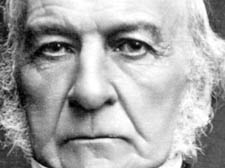|
|
 |
| |

Golden age of Gladstone to the new era of Gordon |
Death of honest politics?
Geoffrey Goodman is not convinced by a fellow journo’s grim analysis
The Triumph of the Political Class.By Peter Oborne. Simon & Schuster £18.99.
WHEN a young, highly talented and prolific political journalist falls seriously out of love with his favoured subject it must be cause for alarm.
Equally troubling, certainly significant, is that the journalist concerned, author of this compelling book, is devoted to the democratic process and not some soured eccentric scribe.
Peter Oborne has been political editor of The Spectator, and is author of a number of books on politics and the media, including an acclaimed examination of the way Alastair Campbell handled Downing Street press affairs.
Oborne has long been an unusual member of the political press corps – firmly independent, striving to avoid close friendships with politicians, always a difficult dilemma for all political writers – and a reporter prepared to court unpopularity in search of courageous journalism. All of which makes his latest book far more than a run-of-the-mill journalistic scowl.
In fact this book is a seriously disturbing analysis about the corrupt behaviour at the top of Britain’s political life and, by definition, the equally dubious standards and professional morality practiced by the national media including a damning indictment of some of the author’s journalist colleagues. An entire chapter is devoted to Oborne’s description of what he calls “Client journalism” in which he describes how journalists who cover the nation’s political life have “become instruments of government”.
He offers powerful evidence of where “reporters and government joined a conspiracy against the public to create a semi-fictitious political world whose most striking features were media events and fabricated stories”. These are grave charges to make against members of his own trade.
Oborne says that this conspiracy is now an integral part of a new “political class” and endemic to contemporary political journalism. This “new class” has emerged mainly in recent years to control the political process and deceive a public from which this power élite has become increasingly remote.
In such a closed circuit of power, Oborne argues that this élite minority, consisting principally of political leaders, unelected advisers and senior journalists who cohabit within a charmed Westminster circle, feed on each other’s self interests.
The author suggests that this process has been developing for about 25 years as young politicians in all main parties emerge from similar backgrounds with university degrees and move straight into think tanks, public relations consultancies or in some cases media roles and are then recruited into a carefully sheltered mafia. Very few of them have experienced “real life” outside Whitehall.
The author declares that “the collaboration or pact between the political and media classes” is now an established fact of life in which “journalists and politicians have each abandoned their proper function”.
Oborne believes this malady constitutes a serious threat to the entire democratic process – so much so that he hears the alarm bells ringing, carrying a threat of authoritarian rule.
Well, how much of all this is hyperbole and exaggeration? Quite a bit in my view. Yet that is not to dismiss Oborne’s accusations and fears as being without substance.
There is much truth in what he unveils; indeed it is a truth already well-known – though rarely admitted – to most journalists who operate in the political world. Nor is it an entirely new phenomenon as Oborne seems to believe as he romanticises the past.
Oborne’s heroic period is the 19th century with its tradition of service, honour and grand statesmanship of which Gladstone was his model of virtuous political leadership.
He regards the old Establishment of traditional British institutions, including the primacy of Parliament itself, as having provided a safeguard against malpractice, corruption and media manipulation. Well, up to a point Lord Copper.
The old class-ridden Establishment was just as much a closed shop against “ordinary people” as Oborne’s contemporary “Political Class” and frankly, in my view, far more so. The influence of an élite minority has a long history in political life. Up until the Second World War it was effectively the norm.
The manipulation of those who owned the press in the 19th century and early 20th century was far more insidious than now, even allowing for Rupert Murdoch’s influence.
The problem of relationships between the political leaders and journalists has always been, a dilemma. Journalists who risk their career to present an honest picture of events and take on the power élite have always been in a minority. Moreover, the power and influence of Downing Street press Gauleiters did not begin with Alastair Campbell.
Of course Oborne is absolutely right to mount his campaign against the kind of manipulation and shabby autocracy of the Blair era – an era which has given both politics and journalism a bad name.
But it is not the end of democracy and Peter Oborne, I know, is wise enough to recognise that.
 |
 |
|
 |
 |
|
 |
|



